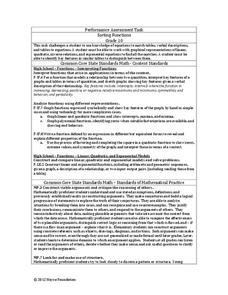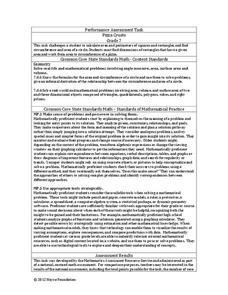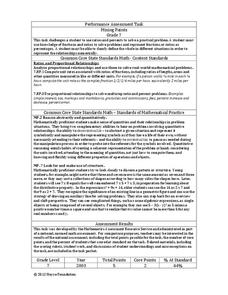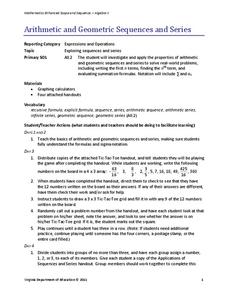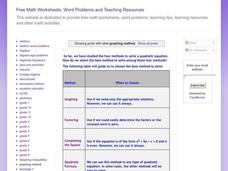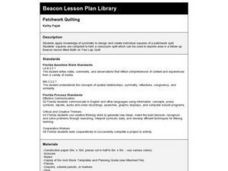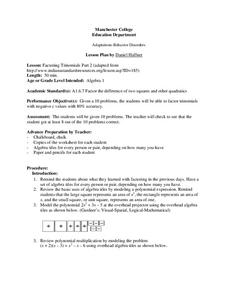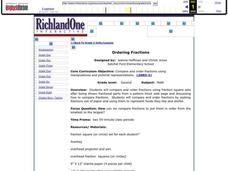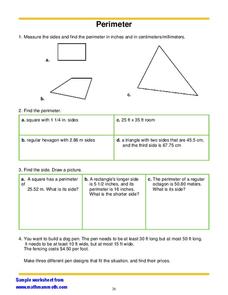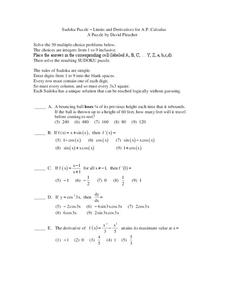Inside Mathematics
Sorting Functions
Graph A goes with equation C, but table B. The short assessment task requires class members to match graphs with their corresponding tables, equations, and verbalized rules. Pupils then provide explanations on the process they used to...
Inside Mathematics
Population
Population density, it is not all that it is plotted to be. Pupils analyze a scatter plot of population versus area for some of the states in the US. The class members respond to eight questions about the graph, specific points and...
Inside Mathematics
Graphs (2006)
When told to describe a line, do your pupils list its color, length, and which side is high or low? Use a worksheet that engages scholars to properly label line graphs. It then requests two applied reasoning answers.
Noyce Foundation
Pizza Crusts
Enough stuffed crust to go around. Pupils calculate the area and perimeter of a variety of pizza shapes, including rectangular and circular. Individuals design rectangular pizzas with a given area to maximize the amount of crust and do...
Inside Mathematics
Snakes
Get a line on the snakes. The assessment task requires the class to determine the species of unknown snakes based upon collected data. Individuals analyze two scatter plots and determine the most likely species for five...
Noyce Foundation
Boxes
Teach your class to think outside the box. Scholars use the concept of equality to solve a problem in the assessment task. They determine how to use a scale to identify the one box out of a set of nine boxes that is heavier than the others.
Noyce Foundation
Mixing Paints
Let's paint the town equal parts yellow and violet, or simply brown. Pupils calculate the amount of blue and red paint needed to make six quarts of brown paint. Individuals then explain how they determined the percentage of the brown...
Inside Mathematics
Conference Tables
Pupils analyze a pattern of conference tables to determine the number of tables needed and the number of people that can be seated for a given size. Individuals develop general formulas for the two growing number patterns and...
Mathematics Vision Project
Module 7: Structure of Expressions
The structure of an expression is a descriptive feature. Learners build a solid understanding of quadratic functions using an analysis of expressions in different forms. The seventh module in a series of nine includes 12 lessons...
Charleston School District
Pre-Test Unit 7: Real Numbers
Don't be irrational! Use this pre-test to assess your classes' ability to work with all types of real numbers. The lesson asks learners to estimate value, evaluate roots, and order numbers. This begins a series of lessons on the real...
Virginia Department of Education
Arithmetic and Geometric Sequences and Series
Examine the importance of sequence and series through contextual situations. Here, learners partake in a five-day unit that begins with the basics of arithmetic and geometric sequences and series. As it progresses, pupils apply the...
Curated OER
7-2 Self Check Pythagorean Theorem Multiple Choice
Middle and high schoolers use the Pythagorean Theorem to determine the length of the sides of a right triangle. They solve distance problems. This one-page learning exercise contains 10 multiple-choice problems. This is self-checking...
Math Mammoth
Area- Perimeter- Volume
In this geometry learning exercise, students use a grid to draw 3 different rectangles that have an area of 20 square units and determine the perimeter of each rectangle. They draw and answer questions related to the relationships and...
Curated OER
Word Problems
In this algebra worksheet, students are guided to choose the best method to solve problems using graphing, factoring, completing the square, and quadratic formula. There are 4 problems with an answer key.
Curated OER
Percentages Introduction
In this percentages instructional activity, students color 25% of 100 small squares blue, 35% red and 30% yellow. Students figure out how many squares they have left and then what percent of the 100 squares are left. Students then work...
Curated OER
Patchwork Quilting
Second graders use symmetry to create their own small quilt squares. They attach all of the squares to create a large class quilt.
Utah Education Network (UEN)
If the Shape Fits
Geometers juggle the idea of polygons. Using a game and manipulatives, they make trapezoids and irregular polygons. They review the algorithms for finding the areas of squares and rectangles. On day one, they find the area of trapezoids,...
Curated OER
Factoring Trinomials
Students factor trinomials and other quadratic functions. In this algebra lesson, students solve trinomials containing negative and positive coefficients. They factor quadratics of difference squares as well as regular polynomials.
Curated OER
Sudoku Puzzle with Limits
In this limit problems worksheet, students solve 28 limits problems. Students find the limits of various functions as x approaches a certain number. Students solve a sudoku puzzle with their answers.
Curated OER
Word Population Problem
In this population learning exercise, students explore the population of the world. They determine the square miles that would be covered if the total population were standing in one spot. This one-page learning exercise...
Curated OER
Polygon Area Review Sheet
In this polygon area worksheet, students answer 8 questions involving the area of several polygons. Students are given various details of the polygon and must find lengths of various polygons.
Curated OER
Ordering Fractions
Second graders use shapes to create various fractions. In this fractions lesson plan, 2nd graders define a fraction, visit a website where they make fractions using various shapes, and use a fraction square set to create and name...
Curated OER
Perimeter
In this perimeter worksheet, students measure the sides of three triangles to find the perimeter in inches and centimeters. Students find the perimeter of a given square and hexagon as well.
Curated OER
Soduko Puzzle
In this calculus worksheet, student solve problems by taking the derivative of the function as x approaches a specific limit. They evaluate trig functions using the properties of trig. There are 26 questions with an answer key.
